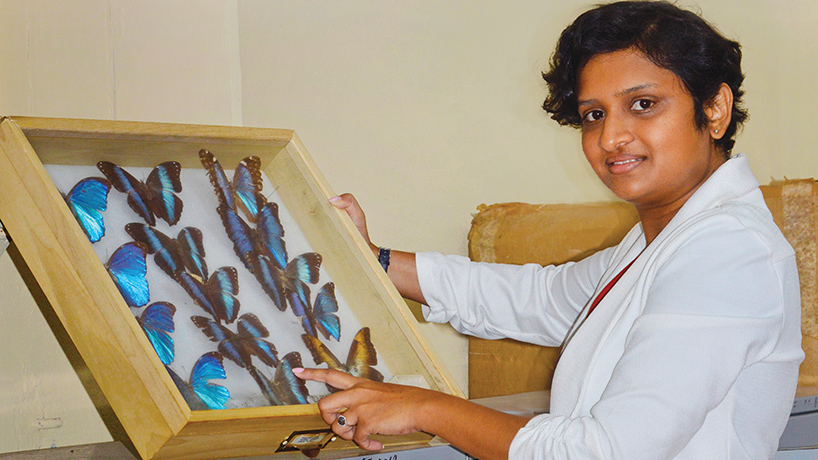
After finishing her biology doctorate at UMSL, Gyanpriya Maharaj returned home as a faculty member and director of the Centre for the Study of Biological Diversity at the University of Guyana. (Photo courtesy of Gyanpriya Maharaj)
When Gyanpriya Maharaj spies multicolored butterfly wings flitting atop a flower, it’s more than an Instagram opportunity for her. It’s a chance to study life.
Her passion for biology can be traced to ecotourism trips throughout the world during her childhood that sparked a fascination with how humans interact with nature.
Butterflies hold a special place in Maharaj’s heart and in her research. Her doctoral work in biology at the University of Missouri–St. Louis with support from the Whitney R. Harris World Ecology Center focused on the pollinators’ feeding behaviors, movement patterns and which colors attract them, with the goal of gleaning information to guide habitat restoration.
Now back in her native Guyana, Maharaj still works with butterflies. But her role as a faculty member and director of the Centre for the Study of Biological Diversity at the University of Guyana also includes research on the behavior of mammals, reptiles and other wildlife.
“It’s a very interesting country to work in,” Maharaj says. “In addition to finding the unknown, it’s exciting to see everything I’ve learned in the classroom and the lab working from a genetic level all the way to an ecosystem level.”
She’s researching opportunities for forest restoration within a select mining area in Guyana with an eye toward informing policy and restoration strategies.
With about 70 percent primary forests, which have not been disturbed by human activities, the South American nation serves as an ideal space to study biodiversity. Every year, new species are discovered, and Maharaj works with her students and local researchers to observe behaviors and changes over time.
“Biodiversity is, simply put, the variety of life present on Earth,” she says. “It involves identifying species, studying their biology and looking at their behavior. There are so many lessons that can be applied to everyday life, like how to interact with nature in a sustainable way. When we study biodiversity, it isn’t just about finding that information but sharing it globally.”
Maharaj’s position at the CSBD connects her with scientists who travel to Guyana from around the world to examine specimens in the center’s museums and herbarium. The CSBD works with agencies such as the World Wildlife Fund Guianas to educate students and natural resources personnel about Guyana’s biodiversity and conservation efforts.
She credits her success to a support system that includes faculty members Godfrey Bourne and Aimee Dunlap, who served as mentors, as well as friends who made her feel welcome in a new country.
Above all, she stresses the paramount importance of keeping a goal in mind.
“Having a plan makes life so much easier,” she says. “That plan will undoubtedly change, and you will have setbacks. But having passion and a love for what you do will guide your journey and get you through the bad days.”
This story was originally published in the spring 2020 issue of UMSL Magazine. If you have a story idea for UMSL Magazine, email magazine@umsl.edu.














